Şanlıurfa is a nice city. So nice, that I almost regretted leaving it after only two days, but another border was so close. I had been waiting impatiently to see what was on the other side. After another tea, kebab and a bazaar walk, I was ready to do a short afternoon cycle to Akçakale, the border town. There I camped on a huge, empty field, and started again in the early morning, to appear on the border just at the opening time.
During all my ride through Turkey, at almost every conversation, I was being asked a question what was my next destination. The answer "Syria" always brought the same sort of responses: "Are you crazy? There is a war!" or just plain "They will shoot you dead". And rarely it was being told to me in English, but more often using the body language. Usually the most expressive person was playing the roles of a gunman and the victim of his bullet, and all the people around were just nodding their heads with serious expressions on their faces. I am aware that most people watch to much television, but the constant pessimism I had been experiencing during last six weeks finally made me a bit nervous about what I would really see there.
At the border I met a bunch of Turkish taxi drivers. Their cars were already parked in a queue in front of the border gate. They greeted me cheerfully and joked a lot, mostly about my chances of avoiding a bullet while riding the bike. When the gate opened, the jokes finished and the fight began. No matter that there had been a queue already, they started a battle over the new order at the other side of the fence. The policemen seemed to be quite experienced in dealing with these savage men, and let only few cars to enter the premises, limiting the scale of conflict inside the terminal. For me the Turkish formalities were just getting the passport stamped and hearing "Güle güle". Then I crossed the no-man's land and appeared at the Syrian gate.
Syrians were quite surprised to see engineless, two-wheeled vehicle appearing at the doorstep of their country. I passed my passport between bars, just to see the guy on the other side starting his motorcycle and leaving with my document. He had ridden to the terminal building, where he examined the passport together with another man. I saw nodding heads, and soon he reappeared again, giving me the passport back and saying "Welcome to Syria". Relieved that it had been so easy, I could not know it was only the beginning.
At the next post I was asked to stop my bike next to a huge stone table. "Please open the bags for checking. Do you want the coffee with sugar?" asked the policeman. I had taken off and opened the panniers, and sat down with the coffee to watch the taxi drivers appearing at the post. There was neither joking nor fighting anymore. This time their role was to be bullied by the customs officers and to pretend that it was a good fun for them.
All my baggage was carefully inspected, and in the absence of firearms or explosives, the electronics became the top focus of the officers. The first question was about GPS, which, for some unknown reason, seem to be still illegal in Syria. If it had not been stolen few months ago, I would probably have lost it there. My simple mobile phone seemed to be a disappointment, so the netbook and camera received most attention. "Please enter your Internet" was perhaps the silliest thing I heard there, but otherwise they browsed the contents of my computer with serious faces, trying to look like they really knew what they were doing. After one of the officers had found photos folder on the desktop and had begun inspecting them, I suggested that there were too many of them and some might be too private to be seen by all the staff of the border post. The inspection finished instantly. After an hour of packing, unpacking and answering very predictable questions, I was free. Free to enter another building and get the passport stamped.
There, another mess awaited me. I handed the passport and received an immigration form. While filling it, I answered a lot of standard questions plus some other, for which the answer was clearly visible in my passport. Well, perhaps transliterating "Wrocław" or Polish names into Arabic is not the easiest thing. After half an hour, I had the papers stamped. The form, which I am supposed to carry until the end of my visit to Syria, is a piece of stiff card, which does not fit into passport even after folding. I considered working on it and giving it a structure of toilet paper, but I thought it would be wise to arrange the visa extension before.
Just after leaving the terminal, I realized that I had a tail. Two of the policemen were following me on a motorcycle. I was wondering how long they would accompany me, and after they had fended off a friendly local who started a conversation with me, I considered asking them directly, but finally decided to keep my mouth shut and wait. Fortunately, after leaving the city I was relieved of their presence.
Syria welcomed me with desert land, and warm, dusty air. The dust had been there since Urfa, but after the border it thickened and the amount of arable land decreased significantly. Apparently, the irrigation from Atatürk lake does not reach the Syrian territory.
I did not have to wait too long to see the famous Syrian hospitality. Virtually everyone was waving at me, and the children in villages were smiling cheerfully, without any demands for money, not to mention stone throwing or any other display of hostility. Quite soon I was stopped by a young motorcyclist and invited "just for a tea" to a nearby building. There I entered a big room covered with carpets and pillows, where an older man was sitting already. His age, clean black robe, white skull cap and golden-framed glasses showed that he was the most important person there. Conversation was not easy, as no one spoke good English and I was just starting to recall the handful of Arabic words I had known before. However, after few minutes a woman appeared in the door, just to pass a huge plate and quickly walk away. The plate contained numerous dishes with a variety of foods. Grilled paprika, fresh tomatoes, yoghurt, jams and some unknown spices were accompanied by a pile of lavash bread and a pot of hot, sweet tea.
Despite his serious look, my host appeared to have sense of humour. At the beginning he passed a hot paprika to me, just to laugh of my reaction after having a huge bite of it. After this joke the atmosphere got much more relaxed and he showed me the local ways of composing tasty meal of the ingredients present on the plate. Soon, a lesson of Arabic started, filling pages of the notebook and getting my throat used to pronounce the difficult sounds.
I tried to figure out the purpose of the room where I was being hosted. The Arabic name of غَرْقْة ضُیُوفْ would later translated for me as "guest room", but nobody could explain why the tiny village had a separate building for it. And why it was so big that it could easily accommodate fifty people. During my visit few other people came and ate, some from the same plate as I did, some being served separate, distinct meals. Explaining this exceeded all our language skills.
It was hard to leave these friendly people, who offered me also a possibility to sleep in this lovely place. It was just early afternoon, so after long thanks and farewells I cycled away. Just to be stopped few kilometres further by an owner of a roadside restaurant and being asked to join him at the lunch. Being full, I politely refused, but asked for a drinking water. A cold bottle appeared instantly, and the host did not want to see any money, wishing me luck on the road.
Hours later, with the sun setting, I was still in the middle of nowhere. I had passed numerous villages, but the desert landscape did not change even a bit. There was a lot of free space, but finding a patch of flat land without big, sharp stones was almost impossible. I happily welcomed an abandoned house on a hill, and cycled there, just to be welcomed by four little and beautiful puppies. The mother, fortunately, was not at home, but the possibility of camping there was ruled out. Instead, I cycled back to the village, just to get some water and perhaps to fish for an opportunity of sleeping there. The first building I reached had a flag and outside toilet, where I found the water tap to be out of order. I knocked the door then, to be welcomed by a young man, who spoke simple English. He was a teacher, and the building was the village school with one simple classroom. After few questions he offered me a place to sleep in his room.
The following morning the kids appeared, amazed to see my vehicle standing in the classroom. However, they did not have much time to focus on me, as the teacher quickly shifted their attention to the lesson's topic. The piece of a plastic pipe, he was holding in his hand and using often, helped the students to keep thinking about maths, not the white-faced strange visitor.
The road I was cycling on was very narrow. Still, it served quite intensive traffic, with a lot of speeding trucks. While in Turkey one could stay firm on the road, there is no more mercy. When trucks are approaching from both directions, even the cars escape from the asphalt onto stony shoulder, not to mention two-wheeled vehicles. Usually the truck drivers announce their coming with a horn from a safe distance, but few times I was overtaken suddenly by a mass of speeding steel, which seemed to appear from nowhere and missed me just by centimeters. With the headwind blowing, even the old and worn diesel engines can come close, without being heard. Having and using a rear view mirror might be a matter of life and death here.
Fortunately, west of the Euphrates, the quality of the road improves and the shoulder is asphalted. Being still a few centimeters lower than the level of the road, it discourages drivers from using it too often, and gives a great relief for two-wheeled riders.
My next stop was a riverside citadel, which served for the famous sultans Nur ad-Din and Salah ad-Din. I camped there, having a nice view on the restored castle. On the next day the wind direction changed and pushed me from behind. Dashing 123km to Aleppo was a piece of cake, and I appeared there early enough to find Internet, browse for a cheap hotel and install myself there before the sunset.
Aleppo (حلب) is big, noisy and unbelievably crowded, at least in the vicinity of the main bazaar, where I reside. Local people proved to be very friendly and helpful, yet not intrusive, and very often they speak at least basic English. I decided to stay for a few days there, in one of the cheapest (5 USD) and most deteriorated hotels I had ever seen. My only company were students of the first year of the university, using the hotel as a place to stay while looking for a flat to rent.
The old city is a true gem, with stony buildings, narrow lanes and low prices. After expensive Turkey I was delighted to find cheap and delicious falafel, kebabs, dates, and wonderful, strong and aromatic coffee, for which there is hardly any match among overpriced European espresso. I also found a workshop, where I asked the owner to extract a broken screw from my front rack. After a hour of struggle to weld something onto the remains, and later to drill them out, he succeeded. The result is not perfect, but the price of 2 USD certainly is.
Due to the recent events, I have not met any other tourists in the city. Perhaps it has influence on my opinion, but I consider Aleppo being one of the most pleasant cities I have visited in my life. After the officers at the immigration department have told me that I could stay with my visa for 30 days, I am considering even longer stopover here.

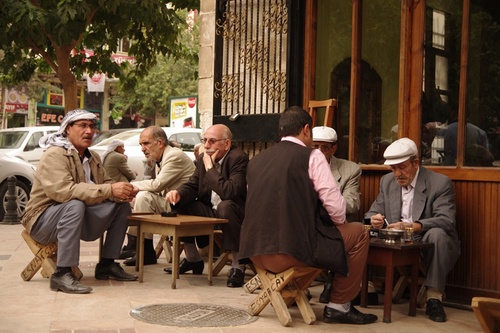
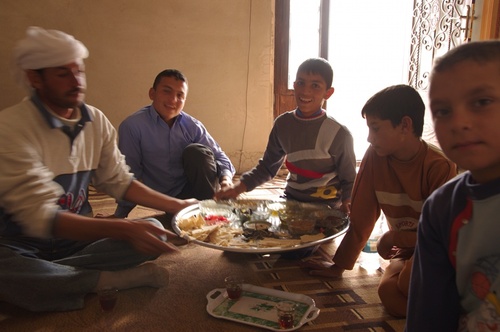
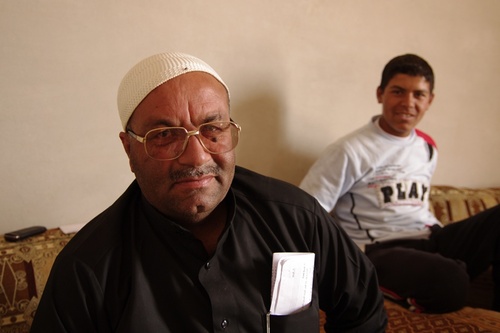
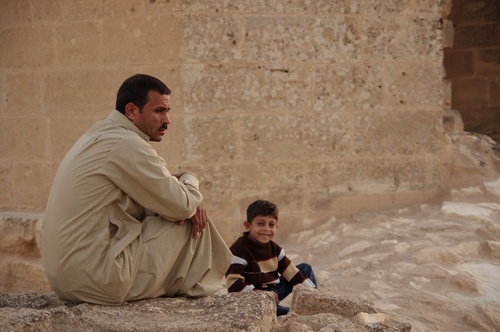
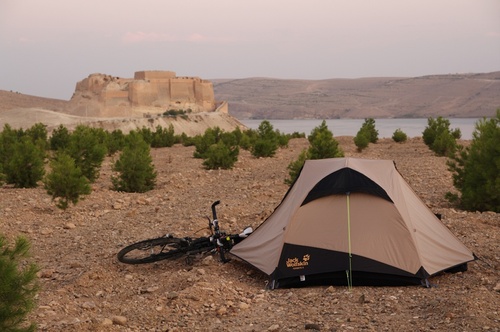
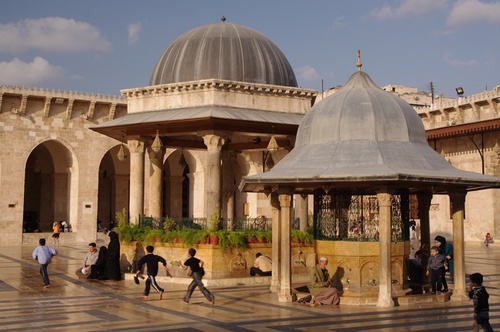
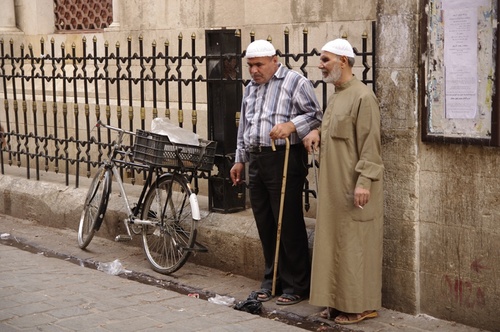
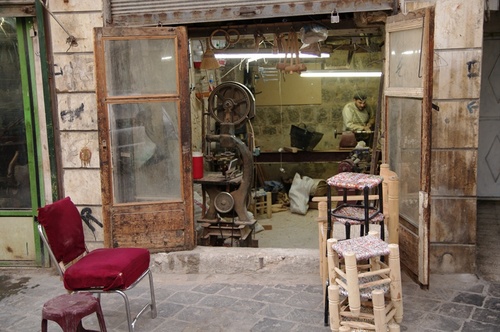
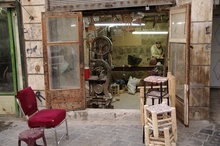

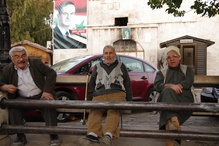

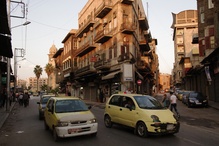
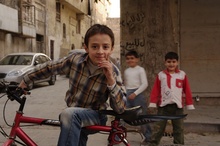
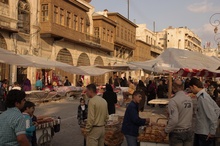
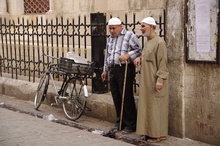
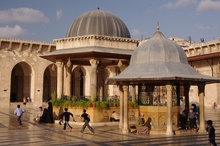

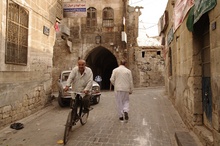
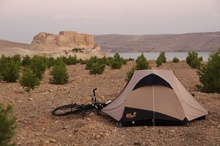
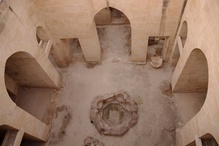
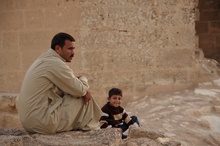
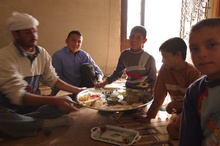
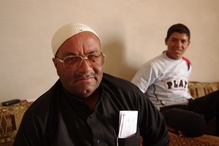
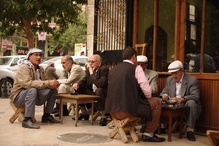
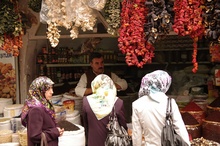
Comments:
hose morales
Pobyt dłuższy o połowę wydaję się kolejną pozytywną wieścią. Oby tak dalej.
Nocleg z widokiem na cytadelę to perełka;)
xmk
xmk
mama
oleo
Miałem znajomego Irańczyka (bardzo dobry dentysta) i zawsze mówił "pojedz ze mną do Iranu, Syrii a zobaczysz gościnność "
Nie wierzyłem, ale teraz Ty niezle mi zamieszałeś.
Zawsze zastanawiałem się czy dałbym radę podróżować samemu, ale chyba nie.
Trzymam kciuki i pozdrawiam
jerzyboy
Chłoń te nastroje i nasiąkaj życzliwością skoro dane Ci jest zanurzyć się w żywą gościnność.RADOSNĄ,AUTENTYCZNĄ.
Przedłużaj te piękne chwile ile się da-nie pędź.Czasu nie prześcigniesz.
Dzięki za lekturę i obrazki z podróży...Dla nas to wielka frajda. "Pędź Latawcze wiatronogi..." .ale uważaj na zakręty do cholery!No...
Uściski
B.E.J.
ps.
Duża Ela dostaje wypieków przy lekturze!!!